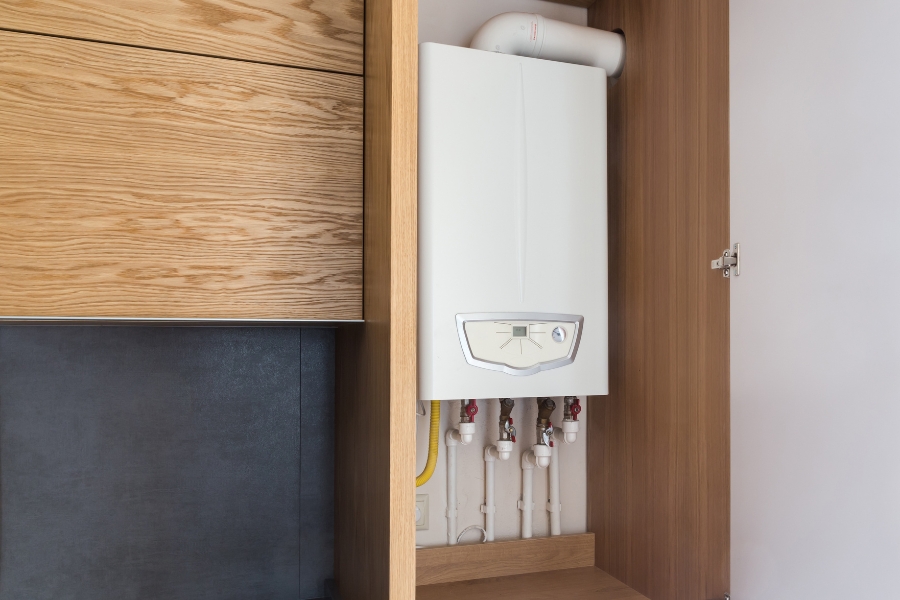The Bathroom. The Boiler. When it comes to home comfort, both boilers and bathroom accessories play vital roles. But can these two essential components coexist in the same space? Let's explore whether having a boiler in a bathroom is a feasible option and what factors you need to consider.
Is Keeping A Boiler In A Bathroom A Good Idea?
Yes! Keeping a boiler in a bathroom can be an excellent idea. It's a safe, practical, and space-saving option for many homeowners. Installing a boiler in the bathroom allows for quick hot water access to fixtures like showers and sinks.
But safety first! Make sure to follow safety regulations, such as positioning the boiler in a cupboard to prevent water contact and ensuring that electronic components are protected.
Benefits Of Putting A Boiler In Bathroom:
Installing a boiler in the bathroom offers convenience and space-saving benefits. Here are some of the benefits of having a boiler in the bathroom:
- Practical Convenience: The bathroom often contains the necessary drainage and waste pipes, making it a practical spot for boiler installation.
- Aesthetics Preservation: Placing the boiler in the bathroom ensures it remains out of sight from the living space, preserving your home's aesthetics.
- Swift Hot Water Delivery: Bathroom installation enables rapid hot water supply to nearby fixtures like sinks, showers, and bathtubs.
- Concealment Options: Larger bathrooms allow for boiler concealment within cupboards, maintaining bathroom decor.
- Towel Storage: Boiler cupboards offer a practical space to keep towels warm and dry.

Types Of Boilers Suitable For Bathrooms:
Different types of boilers are available, including combi boilers and gas boilers. Combi boilers, which provide heating and hot water in one unit, are a popular choice for bathrooms due to their compact size. Gas boilers are also common, but their installation in bathrooms might be more limited due to safety concerns.
Regulations And Safety Considerations
Safety is paramount when it comes to any heating system, especially in areas where water and electricity are present. Here are the key points to remember while installing a boiler in a bathroom.
- Safe Electric Spur Location: The boiler's electrical spur must be situated outside the bathroom to avoid water-electricity contact.
- Electronic Components Protection: Installing the boiler in a cupboard ensures no contact between electronic components and water.
- Distance from Shower or Bath: The boiler should be positioned away from the shower or bath area to prevent accidental water exposure.
- Weight Support on an Outside Wall: Positioning the boiler on an external wall provides structural support.
- Flue Placement: The boiler flue must be away from windows and doors to ensure proper ventilation.
- Gas Boiler Air Circulation: For gas-operating boilers, adequate air circulation within the bathroom is vital for combustion.
Bathroom Boiler Zones: Comprehending Safety Regulations
When installing a boiler in a bathroom, it is important to know the distinct zones mandated by safety guidelines. These zones are established to ensure the secure installation of the boiler, permitting easy access for maintenance and repairs.
Zone 0: This encompasses the interior of the bathtub or shower, this zone should remain away from electrical devices, including boilers.
Zone 1: is the area above the bathtub or shower up to 2.25 meters high. It has a high risk of water exposure, so boilers are not allowed there.
Zone 2: is a space that extends 0.6 meters from the bath or shower and goes up to 2.25 meters high. It is not safe to place a boiler in Zone 2 because it can be exposed to water.
Zone 3: is the area outside of zones 0, 1, and 2 in the bathroom. It allows for installing electrical equipment such as boilers.
UK Regulations And Guidelines:
If you're in the UK, it's important to be aware of the specific regulations and guidelines governing boiler installation in bathrooms. These regulations are designed to ensure the safety of your home and its occupants.
While the idea of having a boiler in a bathroom might be tempting for convenience, safety should always be a priority. If you're considering this option, consult professionals who are familiar with regulations and can guide you toward the best solution for your home's heating needs.






















